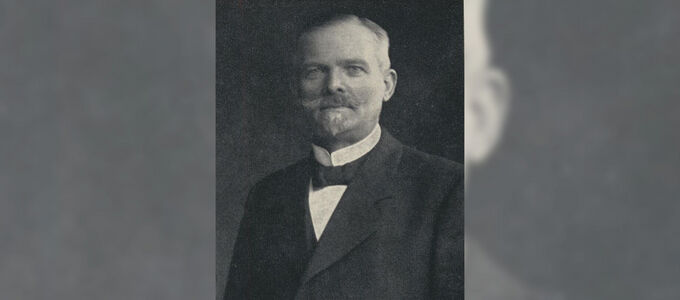
Apostle Albert Güldenpfennig passed away a hundred years ago, on 13 May 1922. He was the 33rd Apostle in the New Apostolic Church and always there for his flock. Join us as we pay tribute to the Apostle by looking at his eventful life.
Albert Adolf Julius Güldenpfenning was born on 7 June (or July) 1858. The sources do not entirely agree on this point. His parents, Georg Friedrich David Güldenpfennig and Karoline, née Gauert, lived in Päwesien, a small town near Berlin (Germany). There young Albert, as everyone called him, attended a Protestant school until he was 14 years old. Then he apprenticed for a building trade and eventually started his own business as a building contractor.
On 4 April 1888 Albert married Rosalie Pauline Helene Peschel. The couple had two sons and three daughters.
Move to Berlin and Hamburg
In 1890 Albert Güldenpfennig joined the then still very young New Apostolic Churcn—it was still called Apostolic Community. Five years later, he received his first ministerial mandate as a Sub-deacon. This was followed a year later by the ministry of Deacon. In 1897 then, Albert Güldenpfennig moved to Berlin with his family to take up his work as a Priest there. Further ordinations followed. On 19 January 1907 then he was ordained as an Apostle Helper by Chief Apostle Hermann Christoph Niehaus. And it was no April Fool’s joke when the Chief Apostle sent him to Hamburg as an Apostle on 1 April of the same year. His working area now included the northern parts of Germany and extended right up into Scandinavia.
Albert Güldenpfennig willingly moved to Hamburg with his wife and children, who were still small at the time. Somewhere around 1913, again the sources differ, he gave up his business so he could dedicate himself to the Church full-time.
Getting settled in a new city
From the records it seems that it must have been difficult for the Apostle and his family to make friends in the new city and get settled in the congregation and be accepted by the members. Following the death of Apostle Heinrich Christian Friedrich Wachmann, the district had been orphaned. Apostle Güldenpfennig later wrote about this period: “I was a stranger here and had big struggles to overcome.” But he trusted in God’s help: “But I continued on calmly and steadfastly by commission of the One who loves our soul, and won one soul after another and one family and congregation after another.” In retrospect at least, he had a positive view of what must have been a difficult period for him. “I can say that the good Lord has been merciful and gave me faithful and kind ministers who stand by me in my work today.”
Always there for the members
The Apostle always sought to be close to the member of his district. For example, he regularly wrote to the soldiers who were fighting on the front lines during World War One to keep them abreast of the developments in the congregations at home and show them that his thoughts were with them.
The Apostle undertook long and exhausting pastoral trips to Scandinavia to care for the congregations there. A trip from Hamburg to Stockholm in Sweden by train took 25 hours. The membership in his district continued to increase and he constantly founded new congregations. Alone in Hamburg four new congregations were established during his time in office. On top of that he provided many congregations with new premises when the need arose.
A premature death
The Apostle suffered from a serious, unspecified illness that ultimately made it impossible for him to continue his work. On 4 December 1921 Chief Apostle Niehaus placed him into retirement. Even after his retirement his condition did not improve. On 13 May 1922 he died in Hamburg-Ohlsdorf at the age of only 63. Some of his last thoughts are said to have been cited from Genesis 24: 56: “Do not hinder me, since the Lord has prospered my way; send me away so that I may go to my master.” Chief Apostle Niehaus held the funeral and many came to pay their last respects. He based the funeral on the words cited by the deceased and paid tribute to him, among other things, by quoting these words from the Bible: “I have fought the good fight, I have finished the race, I have kept the faith. Finally, there is laid up for me the crown of righteousness.”
Following Apostle Güldenpfennig’s retirement, his district was once gain left without an Apostle so that Bishop Johann Heinrich Edmund Blöcker was put in charge and later ordained as an Apostle Helper. Two years later then, he was ordained as a District Apostle to preside over the entire district.
Photo: NAC Western Germany central archive




